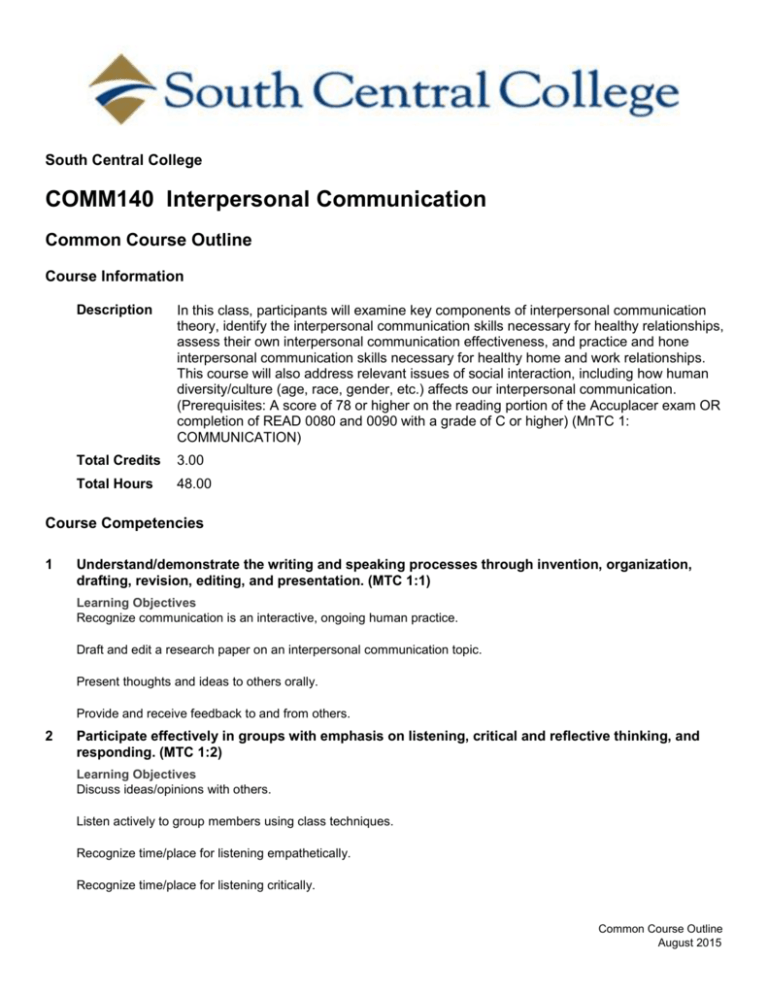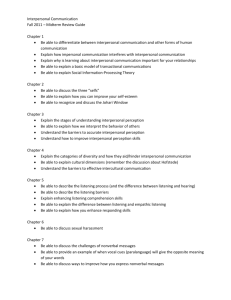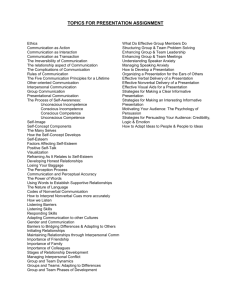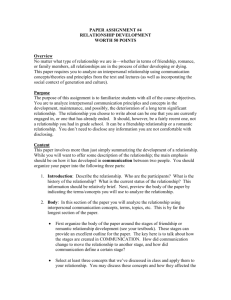COMM140 Interpersonal Communication
advertisement

South Central College COMM140 Interpersonal Communication Common Course Outline Course Information Description In this class, participants will examine key components of interpersonal communication theory, identify the interpersonal communication skills necessary for healthy relationships, assess their own interpersonal communication effectiveness, and practice and hone interpersonal communication skills necessary for healthy home and work relationships. This course will also address relevant issues of social interaction, including how human diversity/culture (age, race, gender, etc.) affects our interpersonal communication. (Prerequisites: A score of 78 or higher on the reading portion of the Accuplacer exam OR completion of READ 0080 and 0090 with a grade of C or higher) (MnTC 1: COMMUNICATION) Total Credits 3.00 Total Hours 48.00 Course Competencies 1 Understand/demonstrate the writing and speaking processes through invention, organization, drafting, revision, editing, and presentation. (MTC 1:1) Learning Objectives Recognize communication is an interactive, ongoing human practice. Draft and edit a research paper on an interpersonal communication topic. Present thoughts and ideas to others orally. Provide and receive feedback to and from others. 2 Participate effectively in groups with emphasis on listening, critical and reflective thinking, and responding. (MTC 1:2) Learning Objectives Discuss ideas/opinions with others. Listen actively to group members using class techniques. Recognize time/place for listening empathetically. Recognize time/place for listening critically. Common Course Outline August 2015 Identify barriers to effective listening. Respond appropriately in a discussion with others. 3 Construct logical and coherent arguments. (MTC 1:5) Learning Objectives Examine movies and/or writing for evidence of interpersonal communication theory. Develop claims for writing and discussion of interpersonal communication theory. Provide evidence for one's claims. Demonstrate how evidence supports one's claims. Identify biases in arguments. 4 Select appropriate communication choices for specific audiences. Learning Objectives Articulate the transactional model of communication. Discuss audience analysis as it pertains to interpersonal communication. Examine the gender and cultural influences on your communication partner. Identify and adapt to the communication style of your partner. 5 Examine interpersonal communication as a mode of human communication. Learning Objectives Define interpersonal communication. Explain usefulness of interpersonal communication skills. Describe key components of the transactional process. 6 Improve self-concept and self-esteem for the purpose of improving relationships. Learning Objectives Define self-concept. Identify the factors that shape the development of self-concept. Describe how intrapersonal and interpersonal communication affects self-concept. Practice self-esteem improvement techniques. 7 Use perception checking techniques to alleviate misunderstandings. Learning Objectives Identify and explain the stages of interpersonal perception. Identify barriers to accurate perception. Practice perception-checking techniques. 8 Listen actively to interpersonal communication partners. Learning Objectives Define listening vs. hearing. Common Course Outline August 2015 Identify barriers to active listening. Apply different types of helping responses. Practice active listening techniques. 9 Choose language to maintain relationships. Learning Objectives Identify word barriers and know how to manage them. Analyze abstract, ambiguous, and unconventional language. Explain what biased language is and identify ways to avoid it. Use language that contributes to supportive, rather than defensive climates. Practice effective ways to communicate emotions. 10 Monitor the nonverbal cues of self and others. Learning Objectives Define nonverbal communication. Explain why nonverbal communication is an important, but challenging area of study. Identify strategies for improving the ability to interpret nonverbal communication accurately. Monitor personal nonverbal behavior in order to manage the impressions you send to others. 11 Maintain relationships. Learning Objectives Define interpersonal relationships. Describe the dimensions of interpersonal relationships. Explain the elements of interpersonal attraction. Contrast complementary, symmetrical, and parallel relationships. Identify strategies for initiating, maintaining, and repairing relationships. 12 Manage interpersonal conflicts. Learning Objectives Define contrast. Contrast types of conflicts. Identify myths about conflicts. Describe styles theory. Identify personal conflict styles and tactics. Use the problem-solving steps to achieve win-win outcomes. Practice conflict management techniques. Common Course Outline August 2015 SCC Accessibility Statement If you have a disability and need accommodations to participate in the course activities, please contact your instructor as soon as possible. This information will be made available in an alternative format, such as Braille, large print, or cassette tape, upon request. If you wish to contact the college ADA Coordinator, call that office at 507-389-7222. Disabilities page http://southcentral.edu/academic-policies/disability-rights.html Common Course Outline August 2015






